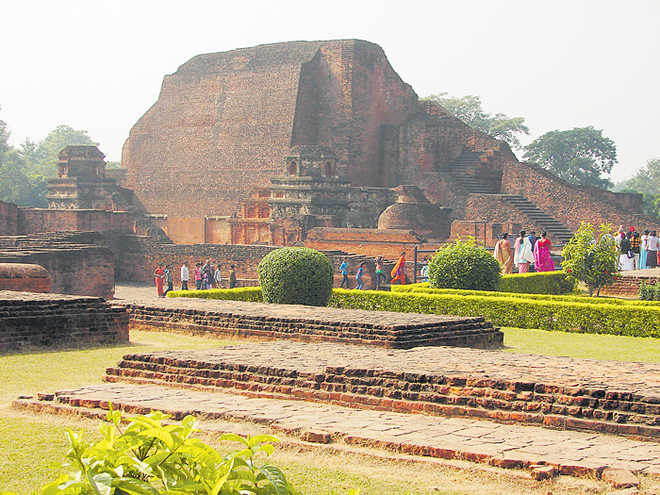Ancient civilisation or primitive society?
PROPONENTS of cultural nationalism keep emphasising that India is an ancient civilisation, which immediately makes our Hindustani hearts swell with pride. India, we contend confidently, was a civilisation while the rest of the world was still barbaric and primitive.
Never mind that the knowledge of most Indians about our civilisation and culture is limited to buzzwords like Harappa, Mohenjo-daro, Sanskrit, Ramayana, Mahabharata, Bhagavadagita, Vedas, Yoga, Ayurveda, Kama Sutra, Ashoka, Ganga, discovery of zero, Nalanda etc. This is enough for us to proclaim without the slightest doubt that India has been a repository of knowledge, wisdom, lofty values, greatness and piety.
The spectacular rise in prosperity levels of the Indian middle-class in the last 25 years, as well as its spread to various corners of the world, has given new wings to this near-fanatical belief in our ancient culture and civilisational heritage, magnifying it in our minds to near- mythical proportions.
In the process, we have started glorifying everything Indian and, by association, everything Hindu, without showing the least capacity to introspect why we still lag far behind in transitioning from an ancient civilisation to a modern society. For we never ask ourselves that if our 5,000-year-old civilisational values and culture were so formidable and fantastic, why have we still remained a poor, backward and primitive country in many ways? Right from millions of people who still defecate in the open to mob-lynching in the name of religion or caste or gau-raksha, why are primitive practices and impulses, rampant in our countryeven in 2017? Why are we nowhere close to being among the most socially, economically and politically advanced nations of the world?
Typically, most of us immediately point fingers at 400 years of subjugation — Mughal rule, followed by the British Raj — as being responsible for exploiting our country and resources, repressing our culture and civilisation, thus leaving India impoverished, illiterate and backward. Ample evidence has emerged that colonial rule certainly dealt a body blow to India's growth, handicapping us from taking independent advantage of the industrial revolution that helped Western countries take a quantum leap forward. Mughal rule, however, doesn't really seem to have caused lasting damage, either materially or culturally. Indeed, with its remarkable ability to tame, embrace and assimilate other influences into its own, India was probably far more vibrant and stable, than much of the world during those centuries.
One has to then look deeper, as to what elements of our 5,000-year-old civilisation hold us back from becoming a progressive society in today's world. Could some of the aspects be the following:
Religion: Almost all the backwardness of India is in some way related to our unhealthy obsession with religion — never-ending rituals, traditions and customs, superstitions and dogmas, fatalistic outlook, caste divisions, gender discrimination, undue importance to worship and piety — all have kept us sub-consciously tethered to medieval ideas and practices. It also begets a tremendous resistance to change. How can we progress in today's day and age, if we as a nation are obsessed with cow protection, mandir-masjid and such completely irrelevant, energy-sapping issues? How is any of this going to improve our lives practically or enrich us culturally? When are we going to stop giving religion a disproportionate hold over our lives?
Idealism deficiency: As a people, we seem to have no use for idealism, values, principles, in daily life. We think of these as abstract concepts that have to be striven for by mankind, nations, society or the world as a whole. We just don't think it is our job to actively practise any of these individually. Whether its personal honesty, civic sense, work-ethic, courage to stand up against even small wrongdoing, social responsibility, understanding our rights and duties vis-à-vis others, we are a nation of shirkers or people who generally do what's easy or expedient, not what is right. Perhaps this is the coping mechanism of the powerless, given that we were ruled for centuries but this trait has become so ingrained in our DNA, that our entire system rewards and supports the bent, the crooked, the mediocre, the mightier — a primitive paradigm that's antithetical to modernity. This is at the root of so many of our failings — rampant corruption, lackadaisical attitude and lack of pride, professionalism, integrity, commitment and sincerity towards one's work, which explains why mediocrity, “chalta hai”, “apne ko kya karna hai” are a way of life in India, not excellence. Instead, we hide our apathy or complicity behind easy, empty, jingoistic displays of love for our country, as if chest-thumping and slogan-shouting are going to help India achieve greatness.
Culture of contempt: Our subcontinent is infected by terrible contempt for other people and their rights. We want total freedom only for ourselves. The concept that our personal freedom does not mean impinging on the liberty, dignity and legal, human and social rights of others is almost alien to our thought process. We follow only those laws that suit us or don't cause too much inconvenience. Democracy, in our limited, crude understanding, is the rule of the majority (not just religious, but any group with superior numbers) and those in the minority simply have to accept this, swallow their dignity and live at the mercy of the majority. This lack of sophistication and nuanced understanding of democracy stunts our metamorphosis into a mature, liberal society based on the rule of law and mutual respect, because the culture of contempt provides fertile grounds for injustice, inequality, intolerance to rear their head and go unpunished.
Indeed, it's time we stopped gloating over the glory of our ancient civilisation and fast-forward our evolution into a modern society by dumping regressive legacies.
The writer is a Pune-based author and film-maker.









